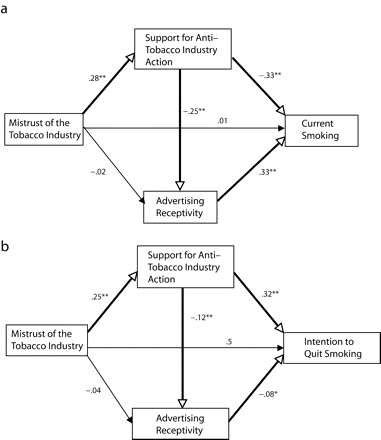The effect of support for action against the tobacco industry on smoking among young adults
- PMID: 17600255
- PMCID: PMC1931473
- DOI: 10.2105/AJPH.2006.098806
The effect of support for action against the tobacco industry on smoking among young adults
Abstract
Objectives: We investigated associations between tobacco industry denormalization attitudes and the smoking behavior of young adults (aged 18 to 29 years).
Methods: We analyzed data from 9455 young adults in the 2002 California Tobacco Survey.
Results: The data showed that 27.4% of young adults were "ever smokers" (smoked > or = 100 cigarettes in their lifetime), of whom 66.9% were current smokers (18.3% of young adults). Denormalization attitudes formed 2 major factors: support for anti-tobacco industry action and mistrust of tobacco companies. In multivariate logistic regression, support for action against the tobacco industry was negatively associated with current smoking (odds ratio [OR] = 0.16; 95% confidence interval [CI]=0.13, 0.19) and susceptibility to smoking, after we controlled for demographics, exposure to smokers, and advertising receptivity. Mistrust of tobacco companies was associated with smoking behavior, with anti-industry support acting as a mediating variable. Among current smokers, support for anti-tobacco industry action was strongly associated with intentions to quit (OR=4.64; 95% CI=3.15, 6.84) after we controlled for demographics, exposure to smokers, and advertising receptivity.
Conclusions: Support for anti-tobacco industry action protects against smoking and is associated with intentions to quit among young adults. Encouraging involvement in tobacco control and against the tobacco industry may decrease smoking among young adults.
Figures

Similar articles
-
Tobacco industry research on smoking cessation. Recapturing young adults and other recent quitters.J Gen Intern Med. 2004 May;19(5 Pt 1):419-26. doi: 10.1111/j.1525-1497.2004.30358.x. J Gen Intern Med. 2004. PMID: 15109339 Free PMC article. Review.
-
Association between tobacco industry denormalization beliefs, tobacco control community discontent and smokers' level of nicotine dependence.Addict Behav. 2013 Jul;38(7):2273-8. doi: 10.1016/j.addbeh.2013.03.004. Epub 2013 Mar 20. Addict Behav. 2013. PMID: 23583832
-
Young adult smoking behavior: a national survey.Am J Prev Med. 2009 May;36(5):389-394.e2. doi: 10.1016/j.amepre.2009.01.028. Epub 2009 Mar 6. Am J Prev Med. 2009. PMID: 19269128 Free PMC article.
-
Tobacco denormalization and industry beliefs among smokers from four countries.Am J Prev Med. 2006 Sep;31(3):225-32. doi: 10.1016/j.amepre.2006.04.004. Epub 2006 Jul 24. Am J Prev Med. 2006. PMID: 16905033
-
"Asia is now the priority target for the world anti-tobacco movement": attempts by the tobacco industry to undermine the Asian anti-smoking movement.Tob Control. 2004 Dec;13 Suppl 2(Suppl 2):ii30-6. doi: 10.1136/tc.2004.009159. Tob Control. 2004. PMID: 15564217 Free PMC article. Review.
Cited by
-
Tobacco Industry Promotional Strategies Targeting American Indians/Alaska Natives and Exploiting Tribal Sovereignty.Nicotine Tob Res. 2019 Jun 21;21(7):940-948. doi: 10.1093/ntr/nty048. Nicotine Tob Res. 2019. PMID: 29546392 Free PMC article.
-
Multiple tobacco product use among young adult bar patrons in New Mexico.Prev Med. 2016 Feb;83:16-21. doi: 10.1016/j.ypmed.2015.11.024. Epub 2015 Dec 5. Prev Med. 2016. PMID: 26666395 Free PMC article.
-
"It's Not Too Aggressive": Key Features of Social Branding Anti-Tobacco Interventions for High-Risk Young Adults.Health Promot Pract. 2021 May;22(3):423-432. doi: 10.1177/1524839920910372. Epub 2020 Feb 28. Health Promot Pract. 2021. PMID: 32111139 Free PMC article.
-
Longitudinal predictors of stopping smoking in young adulthood.J Adolesc Health. 2013 Sep;53(3):363-7. doi: 10.1016/j.jadohealth.2013.04.012. Epub 2013 Jun 12. J Adolesc Health. 2013. PMID: 23763963 Free PMC article.
-
Social branding to decrease smoking among young adults in bars.Am J Public Health. 2014 Apr;104(4):751-60. doi: 10.2105/AJPH.2013.301666. Epub 2014 Feb 13. Am J Public Health. 2014. PMID: 24524502 Free PMC article.
References
-
- Preventing Tobacco Use Among Young People: A Report of the Surgeon General. Atlanta, Ga: US Department of Health and Human Services; 1994.
-
- Gilpin EA, White VM, Pierce JP. What fraction of young adults are at risk for future smoking, and who are they? Nicotine Tob Res. 2005;7:747–759. - PubMed
-
- Wechsler H, Rigotti NA, Gledhill-Hoyt J, Lee H. Increased levels of cigarette use among college students: a cause for national concern [published erratum appears in JAMA. 1999;281:136]. JAMA. 1998;280: 1673–1678. - PubMed
-
- Rigotti NA, Lee JE, Wechsler H. US college students’ use of tobacco products: results of a national survey. JAMA. 2000;284:699–705. - PubMed
Publication types
MeSH terms
Grants and funding
LinkOut - more resources
Full Text Sources
Medical

